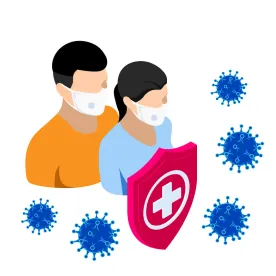As communities throughout the nation and world continue to grapple with the 2019 novel coronavirus (“COVID-19”) pandemic, health care providers and plans are struggling not only to maintain standard operations but also to respond to the pandemic itself. In addition to policies requiring social distancing, travel restrictions, and other public health interventions aimed at containing the growth of COVID-19, federal, state, and local governments have also taken a variety of approaches intended to ensure that the health care system is as prepared as possible.
Congress has embarked on a three-phase effort to support the health care and public health system and address the growing economic impact of COVID-19. H.R. 6201 - Families First Coronavirus Response Act (“Phase 2” or the “Act”), which was signed into law on March 18, 2020, by President Trump, provides approximately $104 billion to help fight COVID-19 and protect workers and families from the health and economic impact of the virus. This Client Alert summarizes the provisions of the Act that relate to health care coverage and financing for COVID-19 testing.
The Three Phases
Phase 1
Congress previously passed and the president signed H.R.6074 - Coronavirus Preparedness and Response Supplemental Appropriations Act, 2020 (“Phase 1”), an $8.3 billion statute targeting coronavirus vaccine research and development. Our colleagues in Epstein Becker Green’s Health Care and Life Sciences practice have prepared a Health Law Advisor blog post summarizing the elements of the Phase 1 legislation expanding Medicare coverage of telemedicine services. Some of the Phase 1 key flexibilities that are being offered by the Centers for Medicare & Medicaid Services (“CMS”) include the ability for telehealth services to be provided in all settings (including a patient’s home), non-enforcement of requirements for a prior established provider-patient relationship, and non-enforcement of technology requirements under the Health Insurance Portability and Accountability Act in order to permit the use of everyday communications technologies, such as FaceTime or Skype.
Phase 2
The Act includes a variety of provisions governing paid sick leave and unemployment benefits for workers and families. Our colleagues in Epstein Becker Green’s Employment, Labor & Workforce Management practice have prepared an Act Now Advisory that provides a detailed summary of these provisions. In addition, the Act includes emergency enhanced funding for state and territorial Medicaid programs to offset projected increased service utilization related to the treatment of COVID-19. This includes a 6.2 percent increase to the federal share of state and territorial medical expenses for Medicaid beneficiaries. This provision will be retroactive to January 27, 2020, and will continue until the Secretary of Health and Human Services declares the end of the emergency. This increase will provide immediate relief to state and territorial budgets by shifting more of the cost of the Medicaid program to the federal government.
Phase 3
Currently under negotiation between the White House and Congress, “Phase 3” is expected to be many times larger than both of the previous statutes combined. Epstein Becker Green will continue to monitor all the legislative and regulatory developments at the federal, state, and local level impacting U.S. employers and the health care system and will release updated and new Client Alerts as efforts evolve.
Health Care Coverage and Financing Provisions for COVID-19 Testing in the Act
The health care coverage and financing provisions of the Act expand coverage for testing for COVID-19 across all the health insurance program markets in the country and provide funding for the provision of testing to uninsured Americans.
Mandated Coverage with No Cost Sharing for COVID-19 Testing
The core health care financing and coverage provisions of the Act require health insurance plans in all markets to provide coverage of COVID-19 diagnostic testing, including the cost of a provider, urgent care center, or emergency room visit in order to receive testing, without any patient cost sharing. Phase 2 applies to self-funded group health plans, fully insured commercial insurance plans throughout the nation, Original Medicare, Medicare Advantage plans, Medicaid, Medicaid managed care plans, TRICARE, covered veterans, federal workers, American Indians and Alaskan Natives (including those referred for care away from an Indian Health Service or tribal health care facility), and uninsured Americans. These provisions supersede the efforts taken by many states, employers, and commercial plans, and impose a national, blanket coverage mandate for COVID-19 testing (and the associated service visit), with no cost sharing for patients.
For uninsured patients, the Act leverages the National Disaster Medical System (“NDMS”) definitive care reimbursement program and appropriates $1 billion for the reimbursement of the costs for the COVID-19 testing (and the associated service visit). Providers must register with NDMS in order to submit claims for reimbursement for service rendered to uninsured individuals. A provider must currently participate in either the Medicare or the Medicaid program in order to be eligible for reimbursement through NDMS. If the provider currently participates in the Medicare program, reimbursement rates will be determined using Medicare Part A and Part B payment policies. However, if the provider does not participate in the Medicare program but does actively participate in a state’s Medicaid program, reimbursement rates will be determined using the applicable state’s Medicaid payment policies.
The effective date of these provisions vary by impacted market. For self-funded group health plans, fully insured commercial insurance plans, and Medicare Advantage plans, the Act gives Secretary of Health and Human Services, Secretary of Labor, and Secretary of the Treasury (as applicable) delegated authority to issue emergency regulations to implement the requirement. For Original Medicare, Medicaid, Medicaid managed care plans, TRICARE, covered veterans, federal workers, American Indians and Alaskan Natives (including those referred for care away from an Indian Health Service or tribal health care facility), and uninsured Americans, the requirements will go into effect immediately upon the date of enactment.
Implications for Plans and Providers
The Act’s sweeping COVID-19 testing mandate reflects a rare federal action requiring coverage of a particular service across all forms of health coverage in the United States, including those that are primarily regulated by states, plus coverage for the uninsured. While the Act limits the scope of this coverage mandate to the COVID-19 test and the visit during which the test is ordered, Congress’s willingness to issue sweeping mandates across all forms of coverage indicates that it may take similar further action in the future if particular services such as respiratory therapy or vaccinations become essential in the COVID-19 response. Unprecedented emergency response actions are also being taken by federal agencies to expand access to services that can help to mitigate the impact of the pandemic. For example, the U.S. Department of Health and Human Services’ Office of Inspector General is now permitting health care providers to reduce or waive cost sharing for all telehealth visits paid by federal health care programs, and it is possible that prohibitions on cost sharing for telehealth could be issued.
The coverage mandate provisions in the Act require insurers and providers to take immediate steps to ensure that coverage, billing, and payment systems are calibrated to bill appropriate codes and not to collect cost sharing from patients. Although the use of the COVID-19 CPT codes should make the calibration of billing, payment, and collection systems for the test relatively straightforward, making similar changes for the associated visits will present a greater challenge. Plans and providers will need to ensure that claims and collections systems flag claims for the COVID-19 test and any associated visits to ensure compliance with the coverage requirements. Finally, providers should take immediate steps to register with the NDMS if there is any chance that they will be called upon to render COVID-19 testing services to uninsured individuals.
Although the Act mandates coverage, it is silent as to the price that plans and providers must agree to for the test and visit. This means that the reimbursement rates established under each coverage program for diagnostic laboratory testing and associated services will continue to control. CMS has promulgated new codes for the coverage and reimbursement of the COVID-19 test under Original Medicare and these rates will likely set the benchmark for commercial reimbursement for the test itself. However, each diagnostic laboratory should evaluate its network-provider agreement and payment policies to determine the reimbursement rate that should apply.
Conclusion and Next Steps for Plans and Providers
Plans and providers should take immediate steps to register with the NDMS and ensure that coverage, billing, and payment systems are calibrated to comply with the requirements of the Act. Plans and providers will also need to establish mechanisms to track such services to reconcile payments retroactively, if necessary, and for related services in case coverage and reimbursement rules change in the coming weeks and months.
The industry should also prepare for additional guidance that the departments may provide in the issuance of emergency regulations. These could include public disclosure and communication requirements, reporting requirements, and oversight and penalty provisions.






 />i
/>i

